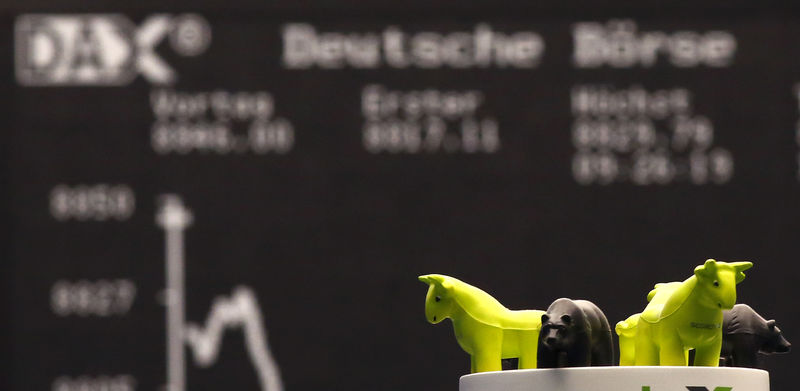By Geoffrey Smith
Investing.com -- Nothing says “dog days of summer” quite like stock markets rallying on the basis of the “hopes” of a diplomat.
Europe’s stock markets were following the U.S. and Asia higher on Friday, still supported by the nebulous comments of Gao Feng, a Chinese foreign ministry spokesman, on Thursday, saying that he “hopes” the U.S. would cancel its plans to impose additional tariffs on Chinese imports and return to the negotiating table.
The word “hope” has done a lot of heavy lifting in the last 24 hours, as investors have seemingly forgotten the reality that a new raft of U.S. tariffs on Chinese imports comes into force at the weekend, and that nothing has essentially changed in a struggle for supremacy in the global economy that, for all that it is conducted in the language of trade measures on a day-to-day basis.
By 5 AM ET (0900 GMT), the benchmark Euro Stoxx 600 was up 0.7% at 379.48, although that’s still over 2% below where it was before Trump escalated the trade angle of the conflict with the announcement of new tariffs at the start of the month.
The U.K. FTSE 100 was up 0.5%, while the German DAX was up 1.0%.
With the exception of Italy, which appears to have ended its latest political crisis, and the seemingly impregnable Danish market, all of Europe’s bourses are down for the month. The fact that defensive-dominated Switzerland is down only 0.1%, while high-beta Russia is down over 5%, says a lot.
Nor does September promise any immediate relief. It’s only two weeks until the European Central Bank is due to unveil what is expected to be a “package deal” of measures to stimulate the economy, including a lower deposit rate, cheaper long-term financing (the so-called TLTROs) and – possibly – a resumption of quantitative easing.
ING analyst Carsten Brzeski says he expects the ECB to resume buying bonds at a rate of 30 billion euros a month, half of its previous peak. However, three of the ECB’s biggest hawks on the governing council have spoken out against resuming QE this week, the Netherlands’ Klaas Knot adding his voice yesterday to those of the two German representatives on the council. Knot said market expectations were “overdone”.
An area where there may be greater hope for new impetus is Brexit. Sterling has refused to fall significantly below $1.22 or €1.10 despite the increasingly extreme measures taken by Prime Minister Boris Johnson in pursuit of a policy whose likeliest outcome is a disorderly “no-deal” Brexit. That suggests that a huge amount of bad news on the Brexit front has already been priced in. If, by some miracle, a hard Brexit can be avoided, there should be plenty of room for a relief rally.
